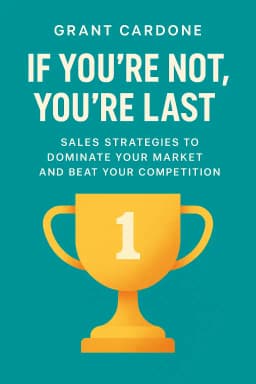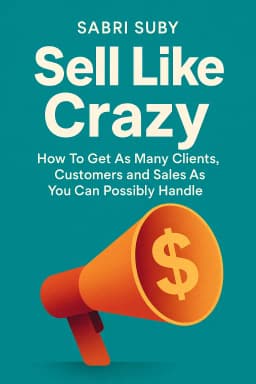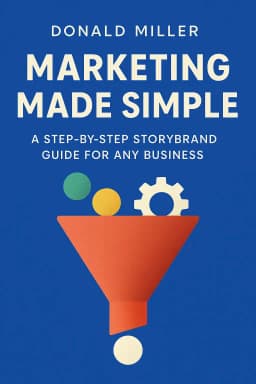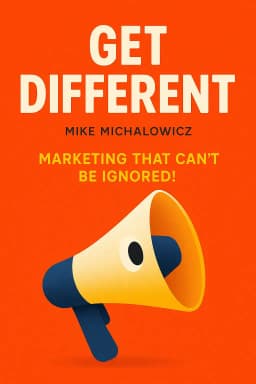
Become the Predator
Sales Strategies to Dominate Your Market and Beat Your Competition
Golden Hook & Introduction
SECTION
Olivia: Alright Jackson, I'll give you one shot. In one sentence, what do you think Grant Cardone's book If You're Not First, You're Last is about? Jackson: Easy. It's about turning a recession into your personal hunting ground, and your competitors are the prey. Am I close? Olivia: Terrifyingly close. It's a philosophy that’s as aggressive as it sounds. Today we’re diving into If You’re Not First, You’re Last: Sales Strategies to Dominate Your Market and Beat Your Competition by Grant Cardone. Jackson: And this isn't some armchair theorist. It helps to know that Cardone himself is a self-made multimillionaire who started with nothing. He faced the loss of his father early on and built his entire career in the trenches of some of the most cutthroat industries, like automotive sales. Olivia: Exactly. That personal history of overcoming adversity absolutely bleeds through every page. There's a raw hunger in his writing. He’s not suggesting you just weather the storm; he's teaching you how to become the storm. Jackson: That "act hungry" philosophy makes so much more sense now. It’s not just a sales tactic for him; it’s a survival mechanism he learned early on. Which I guess brings us to the core of his argument: what to do when the sky is falling.
The 'Advance and Conquer' Mindset: Weaponizing Economic Downturns
SECTION
Olivia: Precisely. When an economic downturn hits, Cardone says people have one of four responses. There's the "Cheerleader," who just insists everything is fine. Think "positive vibes only" while the ship is sinking. Jackson: I know that person. They’re great at parties, terrible in a crisis. Olivia: Then there's the "Old-Schooler," who says, "We just need to get back to basics!" The problem is, the "basics" that worked in a booming economy might be completely useless now. Third, you have the "Quitter," who just gives up, retreats, and waits for it all to blow over. Jackson: Which, let's be honest, is what most people and businesses do. They cut spending, lay people off, and go into hibernation mode. Olivia: And that, Cardone argues, is the single biggest mistake. It leaves the field wide open for the fourth type: the person who chooses to "Advance and Conquer." This is his central thesis. He uses this powerful analogy of an earthquake. If you're in Los Angeles and an 8.5 earthquake hits, you can't just refuse to participate. Denial is useless. The ground is shaking whether you like it or not. Jackson: You either have a plan, or you're just rubble. Olivia: Exactly. An economic contraction is the same. It’s a violent, sudden shift. Your only logical response is to take massive, decisive action. While everyone else is frozen in fear or retreating, you attack. You increase your sales calls, you get more aggressive with your marketing, you become more visible than ever. You take the market share that your scared competitors are willingly abandoning. Jackson: Okay, but hold on. This "Advance and Conquer" strategy sounds great for a massive company like Intel, which he uses as an example against AMD. They have billions in cash reserves. But what about a small business owner? A local coffee shop or a freelance designer? Isn't advising them to "attack" just a recipe for burning through their last bit of cash and going bankrupt even faster? Olivia: That's the most common pushback, and it's a fair one. But Cardone’s point is that "advancing" isn't just about spending money. It's about increasing your activity. It doesn't cost money to make twice as many phone calls. It doesn't cost money to post more on social media, to reconnect with every past client you've ever had, or to personally visit potential customers. Jackson: So it’s a war of attrition fought with effort, not just dollars. Olivia: It's a war of presence. When your competitors go quiet, you become the only voice in the market. He tells this story about his first sales job during a brutal recession in the early '80s. Unemployment was sky-high. He said his survival depended entirely on generating his own opportunities and learning to handle every possible objection. That downturn was his training ground. It forced him to become better. Jackson: That reframes it completely. The goal isn't to outspend your competition, but to out-work, out-hustle, and out-maneuver them while they’re too scared to move. It’s predatory, but in a strategic way. Olivia: It's pure predator-prey dynamics. He argues that being "sensible" and "reasonable" in a downturn is a death sentence. You become predictable prey. You have to become the predator. Jackson: This is why his work is so polarizing. Some readers hear this and feel empowered, like they've been given permission to finally go on the offensive. Others, and I've seen the reviews, find his style brash and his advice reckless. Olivia: Absolutely. His philosophy is not for the faint of heart. It demands a level of aggression that many people are uncomfortable with. But his argument is that comfort doesn't lead to market dominance. Jackson: Okay, so if you're on board with becoming the predator, what does that actually look like day-to-day? It can't just be about making more calls. What's in the toolkit for someone ready to advance and conquer?
The Unreasonable Toolkit: Reactivation, Wow-Factor, and Price Heresy
SECTION
Olivia: This is where we get into his "Unreasonable Toolkit," the specific, almost contrarian actions he recommends. The first tool is what he calls "Power Base Reactivation." Jackson: Which sounds like a fancy term for just calling up your friends and family. Olivia: It's more systematic than that. He says to make a list of everyone you know—family, friends, old colleagues, your dentist, your high school chemistry teacher, everyone. And then, you call them. Not to sell them anything, but to genuinely reconnect. Ask about their lives, their families, their work. The goal is to re-establish the relationship. The business will follow naturally, either from them or their referrals. Jackson: That feels a little more authentic. But he also talks about reactivating past clients, and even unsold leads, right? I read this one story that sounded completely insane. Olivia: Oh, the ten-year follow-up? Yes. He tells a story about a prospect he called twice a year, every year, for ten years. The guy never bought anything. But Cardone kept calling, treating him like a client. In the tenth year, the prospect finally caved and gave him one of the biggest contracts of his career. Jackson: Ten years! That's... I don't know if that's dedication or a clinical condition. But it definitely falls under "unreasonable." Olivia: That's the whole point! A reasonable person gives up after three, maybe four calls. The data he cites says 80% of sales are made after the fifth call, yet only 10% of salespeople ever make it that far. The unreasonable person keeps going. Jackson: Okay, so relentless follow-up is one tool. What's next? This is where it gets really interesting for me—the idea of service. Olivia: This is my favorite part. It's the "Wow" factor. Cardone argues that in a tough economy, you can't win on price. Someone will always be cheaper. You win by delivering a level of service that is so exceptional, so memorable, that it makes the price irrelevant. Jackson: And he has the perfect story for this. Olivia: The Diet Coke on a silver platter. It's brilliant. Early in his career, he's meeting a client on a hot day. He asks if the client wants a drink. The guy says, "Sure, I'll take a Diet Coke." A normal salesperson would just grab a can from the machine. Jackson: Right. Transactional. Here's your soda. Olivia: Cardone disappears and comes back with a polished silver platter. On it is the can of Diet Coke, a tall glass filled with ice, another empty glass, and a straw. He presents it to the client and says, "How would you like it, sir?" Jackson: That is such a power move. It’s theatrical. It’s absurd. It’s… wow. Olivia: The client was blown away. He said he closed the deal right there, without any discount, and that client referred him business for years, telling everyone, "This guy will exceed your expectations, no matter what you pay." That small, unreasonable act of service built a decade of loyalty. It wasn't about the soda; it was about the signal it sent. Jackson: It signals that you care about every single detail. But again, the skeptic in me asks, who has time for that? And how does that scale? You can't give every customer a silver platter experience. Olivia: You can't, but you can adopt the mindset. What is the equivalent of a silver platter in your business? Is it a handwritten thank-you note? A follow-up call just to check in, with no sales pitch? A small, unexpected gift? It’s about finding those small moments to deliver an unreasonable level of care. Jackson: Which brings us to the final, and maybe most heretical, tool in his kit: his philosophy on price. He basically says never, ever compete on it. Olivia: He calls selling on price a "weak-minded" approach. He tells this story of a car dealer who loses a sale not to another dealer, but to a kitchen renovation. The prospect had the money for the car, but the salesperson was so focused on price-matching the competitor down the street that he failed to build any real value into the car itself. The customer wasn't excited. So they took their $40,000 and put it into something they were excited about—a new kitchen. Jackson: So his point is that money doesn't just flow to the lowest price; it flows to the greatest perceived value and excitement. Olivia: Exactly. If you can't make your product more desirable than all the other things your customer could spend their money on—a vacation, a new gadget, a kitchen remodel—you'll lose, no matter how low your price is. Building value, creating that "wow" experience, and being relentlessly persistent—that's the only way to guarantee you're first.
Synthesis & Takeaways
SECTION
Jackson: You know, when you put it all together, this book is so much more than a sales manual. It's a survivalist manifesto for capitalism. It argues that the "sensible" middle ground, the place where most of us live, is actually the most dangerous place to be in a crisis. You either dominate, or you get dominated. Olivia: That's the perfect summary. He’s rejecting the entire idea of being a passive participant in the economy. His challenge is to stop letting the economy happen to you and start creating your own. It's an incredibly empowering, if intimidating, message. Jackson: It really is. It forces you to look at your own behavior. When things get tough, do I retreat? Do I play it safe? Do I become "reasonable"? Olivia: And if you want to take one action away from this, it’s that. Cardone's challenge is to identify one 'reasonable' thing you do in your business or career when things get tough—like cutting your marketing budget or avoiding "risky" new ideas—and ask yourself, "What would the 'unreasonable' opposite of this action be?" Jackson: Instead of cutting the budget, you find a creative, low-cost way to double your marketing presence. Instead of avoiding risk, you take a calculated, bold leap. It's a powerful mental flip. Olivia: It all comes down to one final question, really. Are you playing to survive, or are you playing to win? According to Grant Cardone, they are two very, very different games. Jackson: And in his world, if you're not playing to be first, you've already lost. Olivia: This is Aibrary, signing off.









